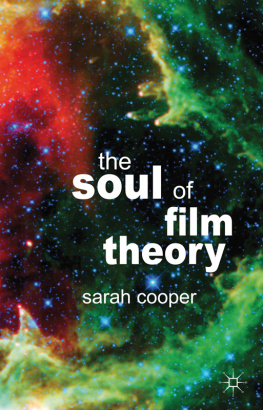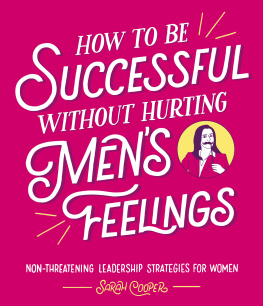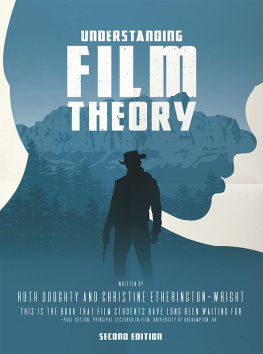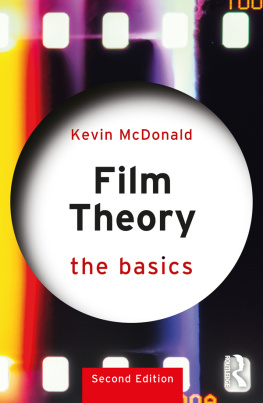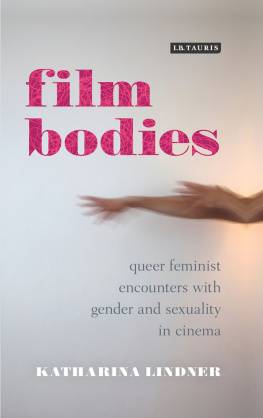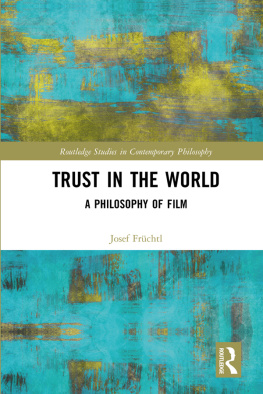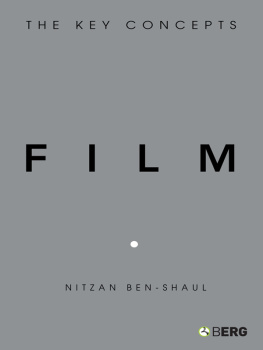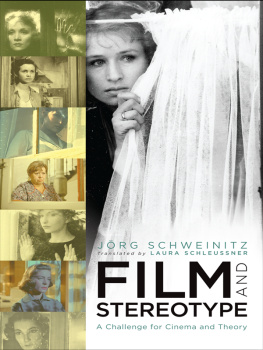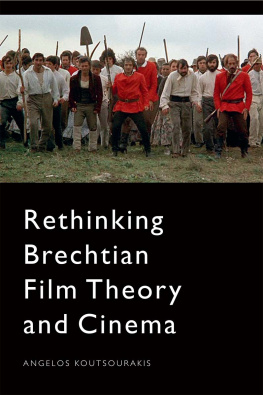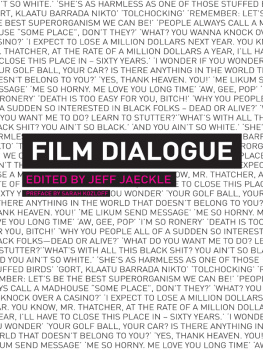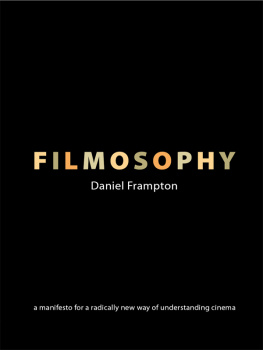The Soul of Film Theory
The Soul of Film Theory
Sarah Cooper
Kings College London, UK


Sarah Cooper 2013
All rights reserved. No reproduction, copy or transmission of this publication may be made without written permission.
No portion of this publication may be reproduced, copied or transmitted save with written permission or in accordance with the provisions of the Copyright, Designs and Patents Act 1988, or under the terms of any licence permitting limited copying issued by the Copyright Licensing Agency, Saffron House, 610 Kirby Street, London EC1N 8TS.
Any person who does any unauthorized act in relation to this publication may be liable to criminal prosecution and civil claims for damages.
The author has asserted her right to be identified as the author of this work in accordance with the Copyright, Designs and Patents Act 1988.
First published 2013 by
PALGRAVE MACMILLAN
Palgrave Macmillan in the UK is an imprint of Macmillan Publishers Limited, registered in England, company number 785998, of Houndmills, Basingstoke, Hampshire RG21 6XS.
Palgrave Macmillan in the US is a division of St Martins Press LLC,
175 Fifth Avenue, New York, NY 10010.
Palgrave Macmillan is the global academic imprint of the above companies and has companies and representatives throughout the world.
Palgrave and Macmillan are registered trademarks in the United States, the United Kingdom, Europe and other countries.
ISBN 9780230365131
This book is printed on paper suitable for recycling and made from fully managed and sustained forest sources. Logging, pulping and manufacturing processes are expected to conform to the environmental regulations of the country of origin.
A catalogue record for this book is available from the British Library.
A catalog record for this book is available from the Library of Congress.
In modernity, soul is now chiefly figured by its absence.
Marina Warner
Plates
The plate section is located between pp. 107 and 108
Acknowledgements
I first began thinking about the place of the soul in film theory when preparing to teach my first classes in classical film theory at Kings College London (KCL). Over the years, the KCL undergraduate and graduate students I have taught and supervised on film theory, from the classical to the contemporary period, have been a constant source of inspiration to me, and I thank them warmly for being such excellent interlocutors. I am deeply grateful to Jan Palmowski for the enhanced administrative support that he made available to me in the summer vacation of 2012, which enabled me to put the finishing touches to this book. At Palgrave Macmillan, I thank Felicity Plester for her enthusiasm for this project, and I am also grateful to Catherine Mitchell and Chris Penfold for their extremely efficient editorial work. The anonymous readers for the press provided invaluable feedback on the project, and I am indebted to them all for their suggestions and comments, from initial engagement with the proposal through to the final clearance read on the manuscript. I have also had the benefit of feedback on ideas in this book from numerous people in audiences at various conferences and symposia since 2008; I thank them, along with the organizers of the following events: Twentieth and Twenty-first Century French and Francophone Studies conference, Washington, DC, March 2008; Geographies of Theory conference, Birkbeck College, University of London, June 2008; International Society for Religion, Literature and Culture conference, Aarhus University, Denmark, October 2008; CRASSH seminar, University of Cambridge, March 2009; In-sight conference, University of Sussex, April 2009; Modern Directors symposium, University of Sussex, May 2009; Film-Philosophy annual conference, University of Warwick, July 2010; International Society for Religion, Literature and Culture conference, University of Oxford, September 2010; Graduate Work-in-Progress conference, St Andrews University, May 2011; Ethics and Cinema symposium, University of Kent, June 2011. I thank the editors of Film-Philosophy for permission to re-use some material from the following article: Mortal Ethics: Reading Levinas with the Dardenne Brothers, in The Occluded Relation: Levinas and Cinema, Special Issue, Film-Philosophy, vol. 11 no. 2 (2007), pp. 6687, http://www.philosophy.com/2007v11n2/. I also wish to acknowledge the following people: Mark Betz, Lucy Bolton, Erica Carter, Jinhee Choi, Catherine Constable, Richard Dyer, Sarah Forgacs, Carla Garcia, Markos Hadjioannou, Alice Haylett-Bryan, Kierran Horner, Ed Lamberti, Tijana Mamula, David Martin-Jones, Aaron McMullan, Ruth McPhee, John Mullarkey, Laura Mulvey, Lawrence Napper, Geoffrey Nowell-Smith, Alastair Phillips, Michele Pierson, S. Brent Plate, Davina Quinlivan, Luke Robinson, Libby Saxton, Alexander Sergeant, Mark Shiel, Ben Tyrer, Beln Vidal, Ginette Vincendeau, Marina Warner, Catherine Wheatley, and Emma Wilson. Clare, Bjrn, Ella, and Ava, along with my parents, made the busy summer of 2012 very special: this book is dedicated to them with much love.
Introduction: The Soul of Film Theory
Writ large across the textual surface of Western film theory is a hitherto unacknowledged conceptual history that is as rich as it is chequered. Walter S. Bloems Seele des Lichtspiels (The Soul of the Moving Picture) of 1922 and Henri Agels Le Cinma a-t-il une me? (Does Cinema Have a Soul?) of 1952 constitute the two most extended and explicit theorizations of the soul within film scholarship.
The Soul of Film Theory refers to the multiple senses of soul that appear across a number of languages and a wealth of theoretical texts, many of which are canonical but some less well-known, in order to recount the history of a multi-faceted concept that has received no sustained attention to date within scholarship on film theory in Europe and the United States. From the classical period
The unease with or outright abandonment of the term in film theorizing from the mid-twentieth century onwards is not only to be explained by theorists wishing to take distance from earlier political and religious coinages of the term. In the era of post-structuralism, which dates from the late 1960s, the emphasis placed on the cultural formation and discursive constitution of identity threw into question attempts to find any such thing as its core or essence. To promote belief in the soul would re-introduce the very essentialism that theoretical argument was seeking to deconstruct, and would have been deemed regressive rather than progressive. Strategic essentialist deployment of soul may have been vital to African-American adherents of the Black Power Movement in the 1960s, for whom it defined black identity with impassioned, revolutionary zeal, but critical theory more generally could not follow suit. It is not anti-essentialism either, then, that accounts for its less frequent presence in film theorizing since the 1960s. Rather, the intermittent presence of the term in recent years has far more to do with a prevailing philosophical and scientific culture in which the body whatever gender, creed, nationality, or race is taken increasingly to surpass the need for any further explanatory principle. It is this culture that informs contemporary film theorizing and its reflections on its inheritance from the classical era.
Thomas Elsaesser and Malte Hagener frame this situation neatly within their comprehensive introduction to film theory by charting its history in relation to the body. Described as an introduction through the senses, their book takes as its guiding question the Without seeking to reinsert the soul as an explanatory principle for this body, and its mind,
Next page
